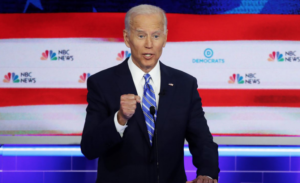The 2020 Democratic primary race is now in full swing, and among the exceptionally large field of presidential hopefuls, one consistently pulls ahead: Joe Biden. The former vice president has a lot going for him in this race — and a lot going against him, if you ask his opponents — but the reason for his overwhelming popularity always goes back to his apparent “electability.”
This term, thrown around by political pundits and casual viewers alike, seems straightforward: it’s a measure of a candidate’s ability to beat incumbent President Donald J. Trump P ’00, a Republican, in the general election. Indeed, many believe that Biden is the only candidate that can defeat Trump. However, electability is not all that it’s said to be. Rather than being a legitimate indicator of electoral success, it’s simply a tactic used to support candidates who seek to maintain the status quo, as Biden aims to. To see success in the 2020 election, Democrats need to rally behind a candidate whom they’re enthusiastic about, not one who fits the conventional definition of “electable.”
Right now, Biden isn’t energizing the democratic base, and, frankly, he’s not trying to. His performance in rallies and debates, including last week’s televised debate featuring all ten major candidates, has been arguably subpar, often falling back on the work of his former boss, President Barack Obama, rather than bringing forth his own ideas for the future. Many question the way he avoids criticism of his controversial decisions as a senator, such as his support for the Iraq War and 1994 crime bill.
So why does this seemingly lacking candidate win every poll by upward of 10 percentage points? His wife, Dr. Jill Biden, put this conundrum well: “Yes, your candidate might be better on, I don’t know, health care, than Joe is, but you’ve got to look at who’s going to win this election.” Few people rally behind Biden for his political platform; instead, they’re settling for the candidate that they believe is just vanilla enough to be electable.
However, if “electability” really only concerns who can beat Trump, then why don’t we apply the term to other candidates? Looking at the race from a statistical perspective, it’d be factually incorrect to say Biden is the sole electable candidate. According to polls by The Washington Post and ABC News, in a hypothetical head-to-head matchup with Trump, Biden beats Trump with 54% of the vote — mere percentage points off the scores of other frontrunners, such as Senators Elizabeth Warren (51%) and Bernie Sanders (53%).
Trump is in a vulnerable position right now. That’s something any Democratic candidate could take advantage of in the general election, not just Biden. A July poll by Public Policy Polling further demonstrated this: soccer megastar Megan Rapinoe beat Trump, 42% to 41%.
So, if other candidates hypothetically perform just as well as Biden, what does “electability” even mean? The truth is that this fantastical X factor of electability is no more than some combination of name recognition, ideological moderacy, and historical precedent (that is, old white men).
However, this definition of electability has been proven to be unsuccessful in past elections: candidates who have been talked up as electable during the primaries have lost during the general election. Hillary Clinton, for example, was a secure yet dull candidate that failed to excite her own party. In the end, she lost to Trump, a candidate that fired up the Republican Party; recent, initially promising candidates like John McCain and John Kerry have met similar fates in the general election.
So, I beg you: champion the candidate that you would actually want to see in the Oval Office, whether it’s for his or her views on the environment or the economy. If that candidate is Biden, then by all means support him. But if not, don’t feel obligated to settle — it’s never successful in the end.





